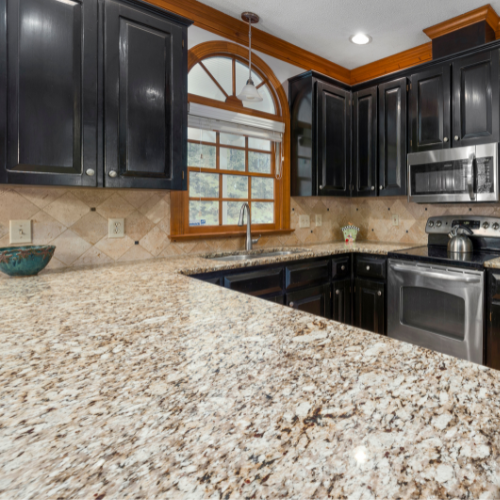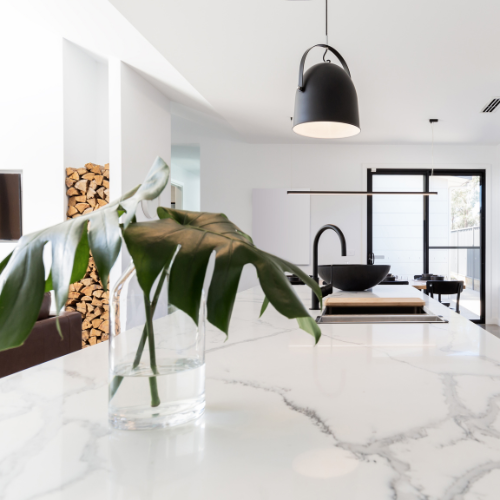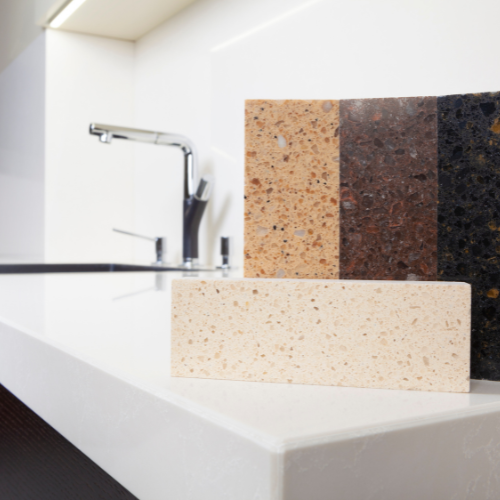Natural Stone vs. Manufactured Stone: How to Pick a Material for Your New Countertops
You’ve been dreaming about beautiful, new countertops for years, searching for the perfect inspiration for your new space. Now that you’re ready to start a project, a new question arises: What type of material should you choose, natural stone or manufactured stone?
In this blog, we compare two popular options from each category. But first, let’s review a quick definition.
Natural Stone vs. Manufactured Stone: Defined
Natural stone countertops are not manmade. The unique colors and patterns of natural stone are the result of the unique geological conditions endured over millions of years.
Types of natural stone include:
- Granite: an igneous rock consisting of quartz, mica and feldspar.
- Marble: a hard, crystalline metamorphic form of limestone.
- Soapstone: a soft metamorphic rock mostly made of talc.
- Quartzite: a hard, metamorphic rock that originates as sandstone.
Manufactured stone is just the opposite: manmade. These types of stones include:
- Quartz: 93% +/- natural quartz combined with polymers and pigments.
- Dekton: made using Sinterized Particle Technology, a high-tech process that simulates an accelerated version of the metamorphic change that natural stone undergoes.
Now, let’s take a specific look at natural granite versus manufactured quartz.
Natural Stone vs. Manufactured Stone Countertop Comparison
Aesthetics
Mother nature can be unpredictable. If you’re the kind of person that really appreciates that random beauty, the aesthetics of natural stone may be what you are looking for.

Natural Stone Countertops: Granite
Some natural stones offer a more predictable, overall pattern, while others vary significantly from one part of the slab to the next. It is always best to view natural slabs before fabrication.

Natural Stone Countertops: Marble
Quartz products, on the other hand, can offer some colors and designs that either replicate natural stone (e.g. looks like marble but is easier on the upkeep) or are not available in mother nature at all.

Manufactured Stone Countertops: Quartz
Because of this versatility in aesthetics, quartz has steadily gained in popularity over recent years, fitting today’s kitchen and bath designs well.
Care & Maintenance
Natural stones have some level of porosity; generally, lighter colors are more porous than darker ones. Because of this porosity, natural stone countertops are typically sealed by your fabricator, and then require periodic resealing through the years with frequency dependent on the color.
The manufacturing process of quartz products makes them virtually nonporous; therefore, they do not need to be sealed. However, that same manufacturing process that makes them virtually non-porous also makes this product more susceptible to heat. So, things hot to the touch should be placed on trivets.
To protect your knives and keep your countertops looking their best, cutting boards are recommended for all surfaces.
Cost
The cost of a granite countertop can be comparable to manufactured quartz, depending on the specific colors chosen. Although, entry level granites are typically less expensive than beginning price point quartz products.
There are different pricing levels in granite as well as quartz, so ask your fabricator for a quote on multiple colors if needed to make your selection.
Conclusion
With so many options available, you are sure to have the perfect countertop for your dream space. Whether you go natural stone or manufactured quartz, you can’t go wrong!
Schedule an appointment today with an Eastern Surfaces showroom sales associate to discover the ideal surface for your home.






